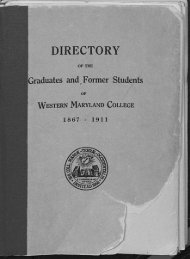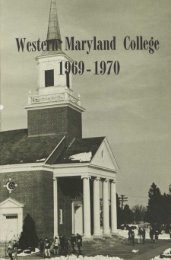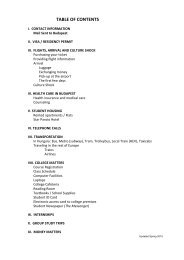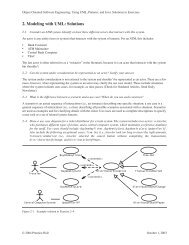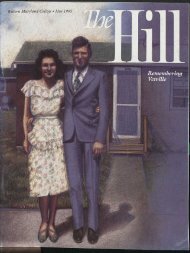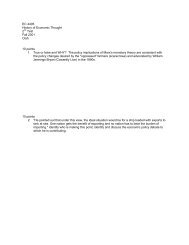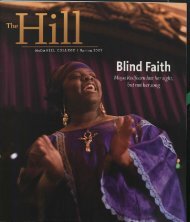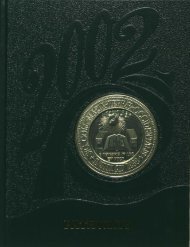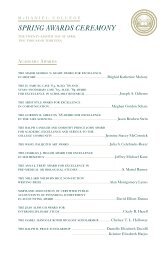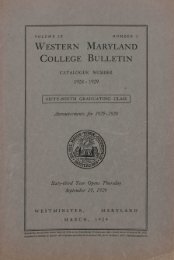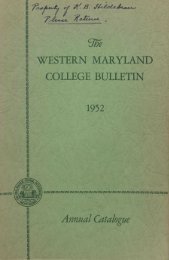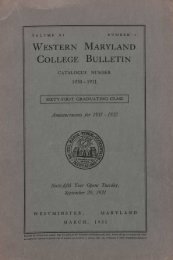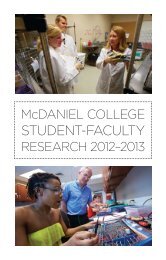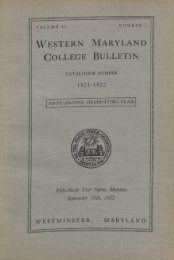Create successful ePaper yourself
Turn your PDF publications into a flip-book with our unique Google optimized e-Paper software.
Annual Alumni Leadership ConferenceUNDERGRADUATE 1966by Philip E. UhrigThe undergraduate of 1966 was the centraltheme under discussion by a panel ofWestern Maryland faculty and fifty alumnileaders who assembled on the Hill in lateAugust. The entire program was under thedirection of chairman, Julian Dyke, and hiscommittee.Alumni involved in many facets of thealumni program were invited as guests ofthe college for this annual meeting. Theyrepresented the following groups: Board ofGovernors, including alumni chapter delegates;Alumni Fund class chairmen andagents; Class Secretaries; and some formeralumni officers.To keep alumni leaders informed of currentcollege policies and problems is thepurpose of this annual conference. In thepast, alumni have been informed about theadmissions policy, the role of the College inliberal arts and other topics of similar value.The 1968 version was designed to discusswith faculty and administrators a profile ofthe Western Maryland undergraduate in1966.The panelists were: L. Earl Griswold,associate professor of sociology; James E.Robinson, Jr., Dean of Students and associat~professor PSYchology; and Ira C. Zepp,Jr., 52, Dean of the Chapel and assistantprofessor of Religion. Wilmer V. Bell, '30,Alumni Association President and Directorof Adult Education for Baltimore City, waspanel moderator.A colloquy was chosen as the method ofp~sentation to allow for an exchange ofviews by panelists and discussion withthethe audience. Focus was on an examinationof the Western Marylandand evaluationCollege student of the present day.It would be impossible to capture theenthusiasm panelists and alumni expressedin the discussions. Furthennore, it would beimpractical to try to report out of contextthe full range of discussions covered at theconference.However, it was agreed that our presentday students want to be involved in currentissues both local and national in perspective.Further, opinion was expressed that \VesternMaryland should feel a continuing Strongresponsibility toward promoting in its studentsa sense of social morality relevant tothe major issues faCing the world todaysuch as the problems of race, poverty, peaceand others.It was felt that the serious-minded students,of which there are plenty on thisand other campuses, are not overjoyed withthe unsettled problems they have inherited.It behooves us then to recognize that studentsare attempting to solve not only theirown personal problems but trying to inter,pret those of social morality in many areaswhere we have failed to provide solutions.Alumni heartily endorsed the amount oftime and effort members of the collegefaculty are spending on the counseling ofstudents, but were surprised at the amountwhich is necessary. Nevertheless, they couldappreciate even more the importance ofproviding a closer tie between student andfaculty in light of the often-voiced opinionthat these relationships are becoming fartoo impersonal on many college campuses.Loyalty of faculty to the institution was reemphasizedas a foundation on which tobuild understanding, the lighter teachingload, a corollary to this point.It was recognized that to understandone's Alma Mater and as a qualiRcation toaccurately evaluate its policies, one mustacquaint himself with all pertinent facts.All agreed that the student of today cannotbe equated with those who attended thecollege ten or more years ago. Conditionsare different as well.It was felt that as condtnona change, thefaculty and administration should be constantlyon the alert to anticipate these andlook for improved methods of handlinggiven situations, and that remedial measuresshould be sought to curtail unrest,dissatisfaction and the challenge of authority.One step in the right direction shouldbe an even closer relationship of studentsand faculty on a cooperative basis in seekingsolutions to problems in all areas ofcampus life.The fact that the world is moving at afast pace is evidence that change is ourconstant companion. Rapid change in policyis not necessarily the answer to all issues. Infact, panelists agreed that often in educationalinstitutions policy changes tend tolag. However, that fact should not be anexcuse for lack of foresight nor of actionon problem areas with which we can easilyidentify. It seemed an acceptable thesisthat if changes in the curriculum are necessary,for example, those institutions willbenefit most which consider the importanceof including students on appropriate committees.The same theory could be appliedto other broad areas where policy change iscontemplated.Students want to be involved in issueswhich will affect them. Alumni feel they,too, have a stake in this and want an opportunityto express interest in ways otherthan by financial contributions, importantas they know that phase is.On the Western Maryland campus therea.r~ man~ Opportunities for students participatetoIII roles of leadership. It was theconsidered opinion of all who attended thepagemteen



